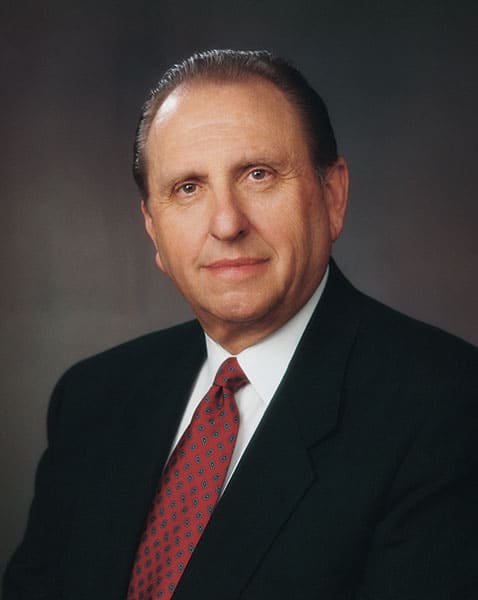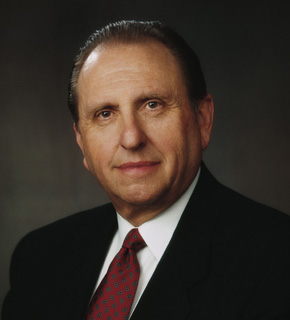Courage
SEARCH BY TITLE
 Be Strong and of Good Courage
Be Strong and of Good Courage
The call for courage comes constantly to each of us. Every day of our lives courage is needed—not just for the momentous events but more often as we make decisions or respond to circumstances around us. Said Scottish poet and novelist Robert Louis Stevenson: “Everyday courage has few witnesses. But yours is no less noble because no drum beats for you and no crowds shout your name.” Courage comes in many forms. Wrote the Christian author Charles Swindoll: “Courage is not limited to the battlefield … or bravely catching a thief in your house. The real tests of courage are much quieter. They are inner tests, like remaining faithful when no one’s looking, … like standing alone when you’re misunderstood.” I would add that this inner courage also includes doing the right thing even though we may be afraid, defending our beliefs at the risk of being ridiculed, and maintaining those beliefs even when threatened with a loss of friends or of social status. He who stands steadfastly for that which is right must risk becoming at times disapproved and unpopular. While serving in the United States Navy in World War II, I learned of brave deeds, instances of valor, and examples of courage. One which I shall never forget was the quiet courage of an 18-year-old seaman—not of our faith—who was not too proud to pray. Of 250 men in the company, he was the only one who each night knelt down by the side of his bunk, at times amidst the jeers of bullies and the jests of unbelievers. With bowed head, he prayed to God. He never wavered. He never faltered. He had courage. . . Brethren, are you the same person wherever you are and whatever you are doing—the person our Heavenly Father wants you to be and the person you know you should be?
 The Call for Courage
The Call for Courage
Tonight, as I look at you young men and realize who you are and what you may become, I declare, “You have great expectations”—not as the result of an unknown benefactor, but as the result of a known benefactor, even our Heavenly Father, and great things are expected of you. Life’s journey is not traveled on a freeway devoid of obstacles, pitfalls, and snares. Rather, it is a pathway marked by forks and turnings. Decisions are constantly before us. To make them wisely, courage is needed: the courage to say, “No,” the courage to say, “Yes.” Decisions do determine destiny. The call for courage comes constantly to each of us. It has ever been so, and so shall it ever be. . . Time marches on. Duty keeps cadence with that march. Duty does not dim nor diminish. Catastrophic conflicts come and go, but the war waged for the souls of men continues without abatement. Like a clarion call comes the word of the Lord to you, to me, and to priesthood holders everywhere: “Wherefore, now let every man learn his duty, and to act in the office in which he is appointed, in all diligence.” May we each have the courage to do so.
 Dare to Stand Alone
Dare to Stand Alone
I believe my first experience in having the courage of my convictions took place when I served in the United States Navy near the end of World War II. Navy boot camp was not an easy experience for me, nor for anyone who endured it. For the first three weeks I was convinced my life was in jeopardy. The navy wasn’t trying to train me; it was trying to kill me. I shall ever remember when Sunday rolled around after the first week. We received welcome news from the chief petty officer. Standing at attention on the drill ground in a brisk California breeze, we heard his command: “Today everybody goes to church—everybody, that is, except for me. I am going to relax!” Then he shouted, “All of you Catholics, you meet in Camp Decatur—and don’t come back until three o’clock. Forward, march!” A rather sizeable contingent moved out. Then he barked out his next command: “Those of you who are Jewish, you meet in Camp Henry—and don’t come back until three o’clock. Forward, march!” A somewhat smaller contingent marched out. Then he said, “The rest of you Protestants, you meet in the theaters at Camp Farragut—and don’t come back until three o’clock. Forward, march!” Instantly there flashed through my mind the thought, “Monson, you are not a Catholic; you are not a Jew; you are not a Protestant. You are a Mormon, so you just stand here!” I can assure you that I felt completely alone. Courageous and determined, yes—but alone. And then I heard the sweetest words I ever heard that chief petty officer utter. He looked in my direction and asked, “And just what do you guys call yourselves?” Until that very moment I had not realized that anyone was standing beside me or behind me on the drill ground. Almost in unison, each of us replied, “Mormons!” It is difficult to describe the joy that filled my heart as I turned around and saw a handful of other sailors. The chief petty officer scratched his head in an expression of puzzlement but finally said, “Well, you guys go find somewhere to meet. And don’t come back until three o’clock. Forward, march!” As we marched away, I thought of the words of a rhyme I had learned in Primary years before: Dare to be a Mormon; Dare to stand alone. Dare to have a purpose firm; Dare to make it known. Although the experience turned out differently from what I had expected, I had been willing to stand alone, had such been necessary. Since that day, there have been times when there was no one standing behind me and so I did stand alone. How grateful I am that I made the decision long ago to remain strong and true, always prepared and ready to defend my religion, should the need arise
 You Make a Difference
You Make a Difference
Some years ago I had the opportunity to address a business convention in Dallas, Texas, sometimes called “the city of churches.” After the convention, I took a sightseeing bus ride about the city’s suburbs. Our driver would comment, “On the left you see the Methodist church,” or “There on the right is the Catholic cathedral.” As we passed a beautiful red brick building situated upon a hill, the driver exclaimed, “That building is where the Mormons meet.” A lady from the rear of the bus asked, “Driver, can you tell us something more about the Mormons?” The driver steered the bus to the side of the road, turned about in his seat, and replied, “Lady, all I know about the Mormons is that they meet in that red brick building. Is there anyone on this bus who knows anything about the Mormons?” I gazed at the expression on each person’s face for some sign of recognition, some desire to comment. I found nothing—not a sign. Then I realized the truth of the statement, “When the time for decision arrives, the time for preparation is past.” For the next fifteen minutes I had the privilege of sharing with others my testimony concerning The Church of Jesus Christ of Latter-day Saints. The seeds of testimony frequently do not at once take root and flower. . . You can make a difference. Whom the Lord calls, the Lord qualifies.
